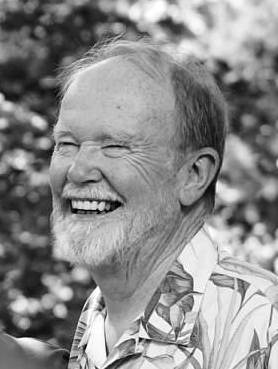The Society’s Founding
By James T. King
In 1971 as an Assistant Professor a few years out of graduate school I was elected to a two-year term as Vice-President of the Illinois Philosophical Association, a position the duties of which consist principally in serving as program officer for the IPA’s annual meetings. I advised the Association’s Executive Committee that I wished to depart from the practice then in place of limiting program inclusion pretty much to the membership, and with the support of Lewis Hahn, then President, I devoted part of the 1972 meeting to Plato, with the feature speaker being Gregory Vlastos.

For the following year I issued a national call for papers on David Hume. I was pleased at the response and devoted one-half of the Association’s 1972 meeting to Hume. Especially impressive was the fact that Hume scholars not on the program attended our meeting in Bloomington, Illinois. (Regrettably there is no listing of who was present at that meeting, and fear of omitting a name makes me reluctant to trust my fallible memory.) During the lunch break at that meeting I canvassed everyone who had attended the Hume session to ascertain who might be willing to come to a meeting on Hume the following year, assuming something could be arranged outside the sponsorship of the IPA.
Encouraged by the response, I returned to DeKalb and consulted with colleagues about sponsoring a meeting on Hume the following year at Northern Illinois University. The Department had a concentration of people who appreciated the history of Philosophy -- such as Craig Walton, Don Livingston, Jim Dye, to name a few -- and with their backing I approached the chair of the Department and the dean of the College of Liberal Arts and Sciences for modest financial support. A Call for Papers for what was then described as the Second Hume Conference was issued, fifty-five papers were received, and in late fall a two day meeting was held with a program consisting of ten papers (a rather impressive nonacceptance rate), again a significant success drawing participants from across the continent. At that time I asked my colleague Donald Livingston to serve with me in a two-man program committee for the following year and we announced a 1975 meeting devoted to Hume.
Just before the Third Hume Conference, I concluded that the time had come for the support of annual Hume Conferences to become autonomous from my campus. Rather ambitiously, the printed program included a “Dinner and Business Meeting to Charter the Hume Society” for October 25, 1974. There was of course no secretary for that session, but cognizant of the historical significance of the occasion, I recorded notes immediately afterwards (on the back of a copy of the program). What follows is pretty much a verbatim transcription.
James King provided a brief overview of the Hume Conferences and stated that it seemed time to decide whether a society should be created which would sponsor conferences in the future. He solicited comments and hearing no objections, declared the Hume Society to exist.
It was agreed that the meeting would be conducted by Roberts Rules of Order and that James King would serve as chairman pro tem. King proposed a provisional statement of purpose: that the Society serve to stimulate research on the writings and philosophy of David Hume and to afford an opportunity for exchange of the results of that research.
A sheet was distributed for signing as a charter member. Dues were set at $10.00.
King noted that Roberts Rules suggest a newly formed Society establish a Charter Committee. He suggested a membership of five. The floor was open to nominations. The five persons elected were: James King (Chair), Nicholas Capaldi, Terry Penelhum, Wade Robison and Donald Livingston.
It was determined that the duties of the Committee would be to draft laws for the Society, to be submitted to the membership for adoption at the next meeting, to publicize the existence of the Society, and to plan for a meeting to occur no later than spring 1976 and prepare its program.
The twenty-seven Charter Members present at the meeting were as follows: Nicholas Capaldi, Don Gotterbarn, John Davis, Dan Goldstick, George Nathan, Haughton Dalrymple, Don Harward, Terence Penelhum, Farhang Zabeeh, Beatrice Sarlos, Thomas Hearn, Robert Burch, Peter Jones, Pall Ardal, Robert Hurlbutt, Robert Anderson, Richard Watson, Wade Robison, David Norton, Richard Brockhaus, Keith Yandell, Ronald Glossop, David Livingston, James King, E. W. VanSteenburgh, James Dye, Donald Keyworth.
Charter Membership was subsequently extended to any person joining during the Society’s initial year. Persons who joined the Society during the 1974-76 dues biennium were: Tom L. Beauchamp, Lewis White Beck, John R. Boatright, John Bricke, Robert Hay Carnie, Vere C. Chappell, William Charron, James Dickoff, William Drumin, W. D. Falk, Donald M. Hassler, Joshua Hoffman, B. G. Hurdle, Patricia James, Clive Keep, E. Jean Kittrell, Thomas A. Mappes, Hiroshi Mizuta, Joao Paolo Monteiro, Jeffrie G. Murphy, John O. Nelson, James W. Oliver, Steven C. Patten, Ralph S. Pomeroy, John Vladimir Price, Michael S. Pritchard, David R. Raynor, J. Charles Robertson, Bernard E. Rollin, Paul W. Sharkey, Wayne Sheeks, Patricia Smart, Constant Noble Stockton, D. C. Stove, Howard F. Walter, Don G. Wester.
During the Society’s first year the Executive Committee met and fashioned a Constitution later approved by the membership, the document under which the Society operated for its first decade. The Constitution provided for two officers: a Chairman and a Secretary. After completing a year as Chairman, I assumed the role of Secretary and started publishing the Bulletin of the Hume Society. Nicholas Capaldi was the Society’s second Chairman.
The Fourth Hume Conference (which was the first held under the auspices of the Hume Society) was held at the University of Wisconsin in 1975.
James King, Northern Illinois University
From the Bulletin of the Hume Society, Fall 1993, Vol. XXII, No. 2